#this is a WEST INDIAN HOUSEHOLD
Explore tagged Tumblr posts
Text
Mom thinks my music taste is too white 347 dead 8208 injured
#'i didnt think you listened to music like this' MOTHER????#you RAISED me#this is a WEST INDIAN HOUSEHOLD#one of the most hurtful things shes said to me fr </3#my posts
7 notes
·
View notes
Text
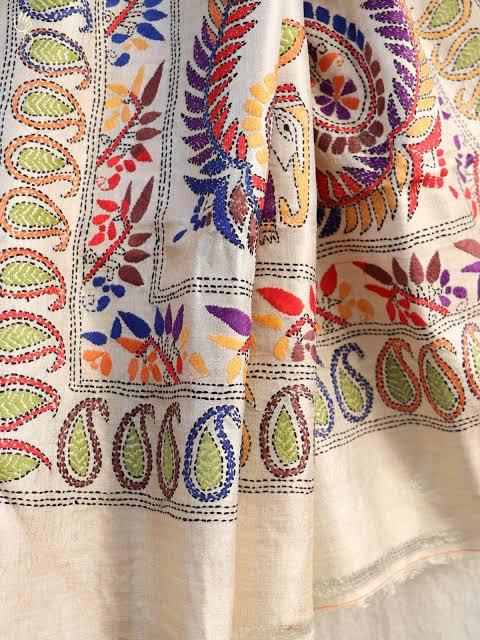
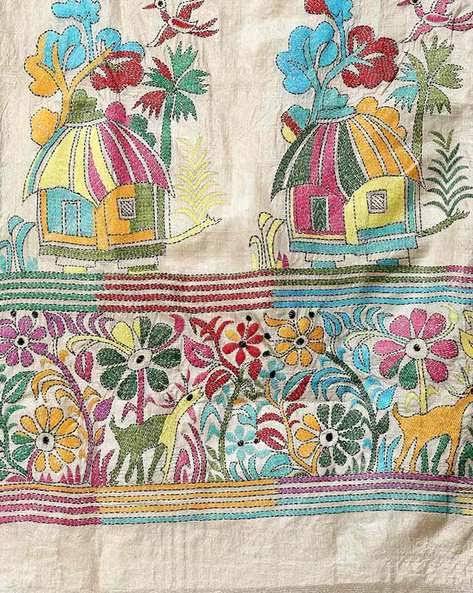
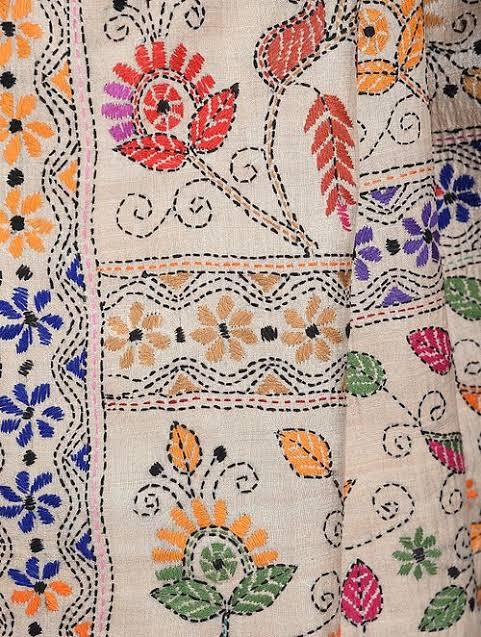
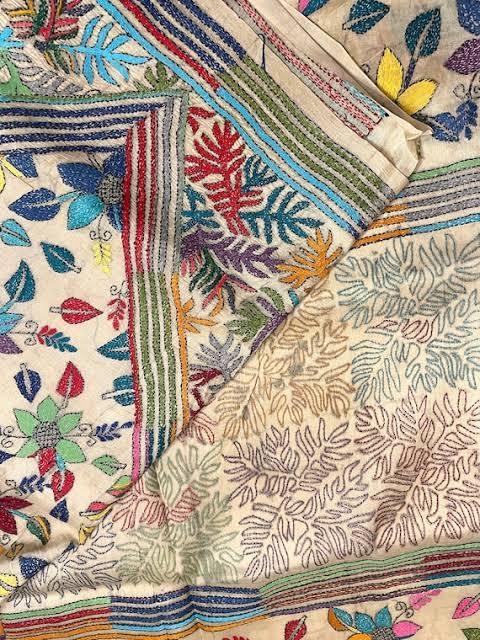

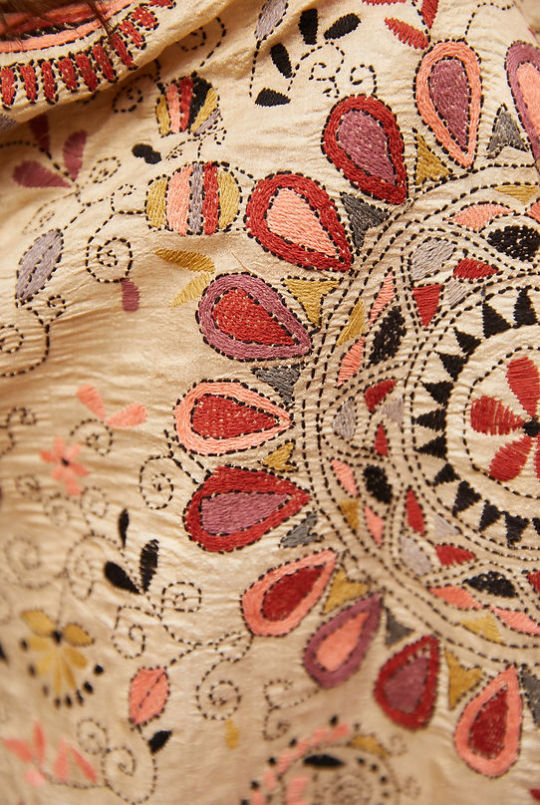
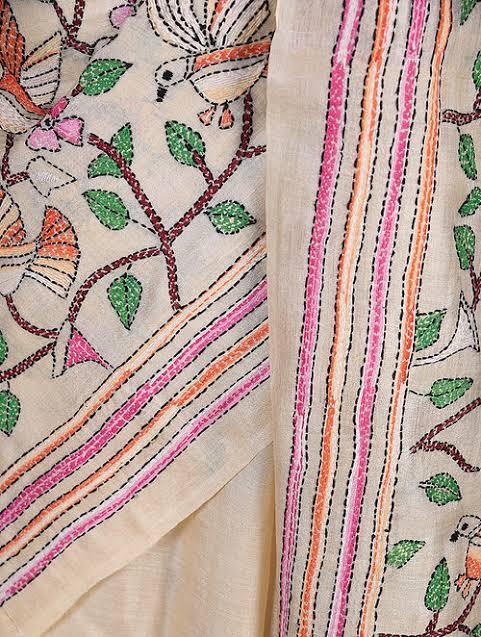
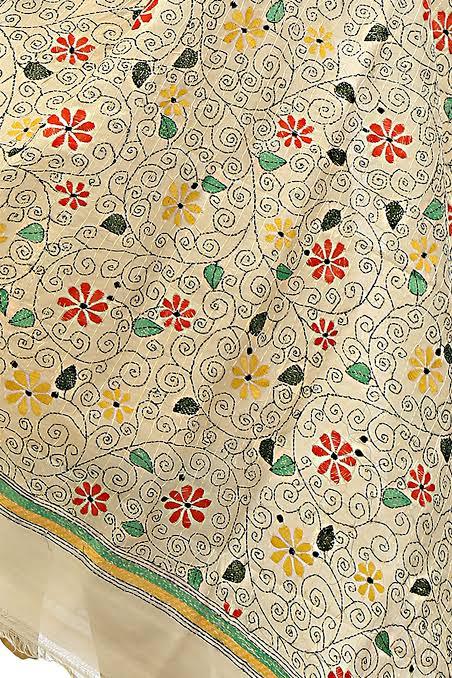

Kantha (Bengali: কাঁথা) is a form of embroidery originating in Bengal region, i.e. Bangladesh and the Indian states of West Bengal, Tripura and parts of Assam. It has its roots in nakshi kantha, an ancient practice among bengali women of making quilts from old saris and rags by sewing them together. In modern usage, kantha generally refers to the specific type of stitch used. The kantha needlework is distinct and recognised for its delicacy. The stitching on the cloth gives it a slightly wrinkled, wavy effect. Today, kantha embroidery can be found on all types of garments as well as household items like pillowcases, bags and cushions.
While it is an increasingly diversifying art form, traditional kantha embroidery motifs are still sought after. Traditional kantha embroidery is two-dimensional and are usually of two distinct types: geometric forms with a central focal point, carried over from the nakshi kantha tradition and influenced by islamic art forms; and more fluid plant, floral, animal and rural motifs with stick-figure humans depicting folklores and rural life in Bengal.
1 / 2 / 3 / 4 / 5 / 6 / 7 / 8 / 9 | textile series
#bangla tag#textiles#ots#kantha#nakshi kantha#bengal#bengali#bangladesh#india#embroidery#needlework#textile art#embroidery art#south asia#south asian
2K notes
·
View notes
Text
Monkey Man and why I loved the heck out of it

At it's core, it's a Bollywood flick presented to the West with familiar nods to previous action films - I definitely picked up hints of Tony Jaa's influence on Asian action flicks throughout.
It's heavily focused on police corruption, something commented a lot about in India, and here, more importantly, Indian films. Just like America has its love affair with mobster flicks, Bollywood has a long history featuring films that showcase police corruption, sometimes tied into political extremism, fanatical or greedy religious leaders, and Monkey Man comments on all this as well and pays nods to that commonality. We've got televangelists and religious leaders in the states funnelling money, preaching prosperity gospel, and using it to influence politics and fund lavish lifestyles here.
Monkey Man shows this happening in India, and is filled with Indian culture and symbolism through out. The focus on Hanuman, the god and one worshiped by the strong, chaste, wrestlers, champions, and fighters. It's a common thing to have a household deity if you will. Some families might choose to focus worship on Ganesh, others Hanuman, some might do Mata Rani or Lakshmi. Here, it's the divine Vanara (monkey people race) - one of the Chiranjivi - immortals/forever-lived.
Hanuman. Themes of rebirth, common in South Asian history and mythology are present from Kid being a ringer, beat up fighter getting whooped for money to being reborn and facing his trauma through a ritual/meditate process that I don't want to get too much into to not spoil the movie. Post that, he begins his own self alchemy to really become the true Monkey Man. Nods to Ramayama, and an unapologetically Indian story featuring dialogues throughout in Hindi - don't worry, there are subtitles.
And of course a love for action flicks before it, all the way back to Bruce Lee. A beautiful use tbh of an autorickshaw (and you might know them as tuk-tuks in Thailand) which are popular in India with an added kick...I swear, that thing had to be modified with a hayabusa motor. Which is an actual thing people do - modding those dinky rickshaws with motorcycle engines, and considering they weigh nothing at all, they can REALLY FLY once you do that.
Monkey Man brings to the big screen other elements of India people might not know about, such as the gender non conforming and trans community that has a long history in India, presenting them as action stars as they go up against a system of corrupt elites oppressing part of the city, marginalized communities, and minority voices as depicted in the film. I'm not sure if people are going to get all of that without having the context, but I love that it does it without holding anyone's hands.
It's a fun action flick to see in the age of superhero films, and I say that as an obvious superhero/sff nerd. Also loved that Dev included a little bit about Hanuman's own story in the film, and the loss of his powers - almost mirrored by Kid's own loss of self/skills, strength until he confronts his trauma and is reborn, and in fact, remade (not necessarily the same). Also, the use of music was brilliant, including one scene with a tabla (the paired hand drums of south asia) - and Indian music is central to Indian stories.
This is a culture with evidence going back to the Paleolithic with cave murals showing art of Indian dance nearly 30,000 years ago. Yeah, that far back. As well as Mesolithic period art depicting musical instruments such as gongs, lyres, and more.
Indian music is some of the earliest we can find that has high developed beat and rhythm structures such as 5, 7, 9 and now the extremely common and known 4/4 and 3/4 - which so much of Western music is built upon. The foundations and experimentation of/in Jazz. John Coltrane and John Cage were heavily inspired by Indian music and incorporated a lot from it into their works. And Monkey Man blends Eastern and Western music through the narrative as comfortably as it does an Indian story in a very familiar Western accessible structure.
Dev did a wonderful job. And thanks to Jordan Peele for bringing it to screens.
#monkey man#jordan peele#dev patel#Bollywood#bollywood movies#Indian films#indian culture#India#hanuman#ganesh#south asian#Ramayama#superhero#superhero films#Indian music#bollywood songs#loved this film#great film#love this movie#john coltrane#John Cage#Jazz#music soundtrack#films#movies#movie review
61 notes
·
View notes
Text
In 1913, a year before the Panama Canal was completed, the journalist Frederic J. Haskin wrote that “the conquest of the Isthmian barrier was the conquest of the mosquito.” This was a period when America [had] [...] by 1902 taken control of Cuba, Puerto Rico, the Philippines, and Guam. [...] The connection between mosquito control and the United States’ imperial conquest can be seen in the work of William C. Gorgas, the Alabama-born Army surgeon who led efforts to eradicate yellow fever and malaria -- both mosquito-borne diseases -- during the first US occupation of Cuba (1898–1902) and was subsequently appointed Chief Sanitary Officer of in Panama. [...] Gorgas claimed that he had “made sanitary discoveries that will enable man to return [...] and again live and develop in his natural home, the tropics.” [...] In particular, the dwellings erected for the Isthmian Canal Commission (ICC) conjoined the management of mosquitos with manipulating the interactions between people of different races and social classes. [...]
Gorgas arrived in Panama in 1904 [...]. Gorgas and others saw sanitation work as indistinguishable from the military occupation in Cuba and the success of the canal construction in Panama. [...] Spraying was largely carried out by mosquito brigades, which checked households for compliance [...]. But [...] these brigades also policed the activity of local residents. [...]
---
There was much debate not only about who to enlist to build the canal, but also how to prevent organized resistance and revolt among them.
As one official testified to the US congress in 1906, “there must be on the Isthmus a surplusage of labor. Otherwise, we will have interminable strikes.” [...]
Furthermore, rather than one vulnerable workforce, Chief Engineer John Stevens believed that having several different nationalities and ethnicities would be easier to divide and create competition, compelling them to work harder.
In order to do this, the ICC created a segregated, dual payment system: the gold and silver rolls. [...] [W]hite workers from the US were mostly hired for skilled positions and received payment in gold. These “gold-roll” employees could spend leisure time in segregated clubs [...]. West Indians and Black workers from the United States were mostly assigned to the silver roll. [...]
[T]he gold- and silver-roll system constituted an apartheid society, a perverse reincarnation of the contemporary Jim Crow system that was in full effect at the time in the United States. [...]
---
Although the ICC offered free housing to all its gold-roll employees, silver-roll employees paid rent. [...] As late as 1910, Galician workers on the silver roll were still living in boxcars ventilated only by a few small punched openings. [...] When West Indians requested basic amenities like blankets and shelter to keep their clothes from being soaked in the rain, the US government responded that they didn’t even need sheds. [...] For white workers [...] Type 13 [housing types] not only features a wraparound screened porch as a circulation space, but also a prominent band of empty space surrounding the enclosed bedrooms [...].
The distinctions associated with the categorical, systematic definition of different domestic architecture for different classes of people follows a history of typology in architecture and criminology that was closely associated with scientific racism, social Darwinism [...].
George W. Goethals, who took over as Chief Engineer of the project from Stevens in 1907, responded to requests for mosquito nets and screens for West Indians by repeating a common and racist misunderstanding: “It is generally admitted … [t]hat the colored people are immune.” Yet in 1912, “as many as two-thirds of all West Indians reported sick or required medical attention … [m]ost of them catching malaria several times [...].”
---
Structured by prejudice, anti-mosquito architecture allowed malaria to continue spreading while reinforcing racial hierarchies. [...] US imperial concepts about the tropics as a place [...] “[...] divided the civilized, temperate North from the heat, humidity and backwardness of the tropics.” [...] While managing the laborers through their relationship to insects -- and each other -- this low-cost architecture was crucial in the broader effort to turn the Isthmus into an imperial outpost and render the landscape tropical.
---
All text above by: Dante Furioso. “Sanitary Imperialism”. e-flux (Sick Architecture series). May 2022. [Bold emphasis and some paragraph breaks/contractions added by me.]
#abolition#ecology#landscape#bugs#caribbean#imperial#colonial#multispecies#tidalectics#tropicality and exoticism and orientalism#geographic imaginaries#archipelagic thinking
127 notes
·
View notes
Text
mahabharata fix it headcanon (kind of??)
Man, sometimes I wish to read a funny, crack-y retelling of the Mahabharat. Of Pandavas and Kauravas having more or less a friendly, playful rivalry than the blood feud they have in the canon. Of Karna being the mediator between the cousins if things got a little too heated. Of Abhimanyu, Ghatotkach and other Upapandavas being spoilt rotten by their 100 uncles and Lakshman Kumar and other Kaurava children having study sessions with Yudhishthir and Sahadev, going on adventures with Bheem and Arjun.
Yudhisthir would be the King of Indraprastha and Duryodhan, the King of Hastinapur and the Kuru empire stretches from Gandhar in the north-west to Anga in the north-east, with two stronghold capitals to keep it secure instead of just one. Karna, despite being offered to be crowned the King of either kingdom, chooses to let his younger sibling and cousin take over, being content in his small, prosperous territory of Anga.
Kunti and Gandhari would both be mother figures for both sets of cousins, acting as advisors in the family. Bhishma, ever the guardian of his large family and Vidur, the maverick politician, retain their roles but have relaxed responsibilities as the kingdom (and the household) is at peace.
Dhritarashtra and Shakuni would have some skirmishes between them, classic brother-in-law tussle but for the most part would be harmless. The former king sits at the advisory board of Hastinapur while Shakuni is properly coronated the king of Gandhar, to keep him from meddling in the internal matters of the crown.
The Queens, Draupadi and Bhanumati would be great friends with respect and affection for each other. Being in charge of not just the palace but also crucial departments (finance for Draupadi, public welfare for Bhanumati) of their respective kingdoms. Draupadi acting more or less as an older sister to all of her fellow co-queens, but she has very special affection for Subhadra. It's no wonder Panchali loves her, as she's Krishna and Arjun's darling too.
The Rakshabhandhan at the Hastinapur palace is nothing short of an annual grandiose event. There are friendly bets amongst all the brothers on who can get their dearest sister/cousin the best gift. Of course, Dusshala loves her brothers and cousins too much (though Duryodhan and Nakul-Sahadev are secretly her favourites) to actually give a ranking of the gifts, so the contest remains at a draw for year after year.
Karna chooses to stay at Hastinapur, when Indraprastha should've been a rather obvious choice. Not that he doesn't like spending time with his siblings, but he just has a closer bond with his cousins. Not to mention there's a whole other reason he spends more of his free time at Hastinapur. The Pandavas are well aware of his affection for Duryodhan and tease him endlessly about it, just as the Kauravas tease their eldest for being so enamored by the Pandav-jesth.
Arjun is Karna's favourite sibling (ha, I did say this was a crack-y au) just because of the sheer similarities they have. They help each other to hone their archery skills, with Karna teaching Arjun secret techniques he learnt from his time with Parshuram. Arjun admires Karna and the way he is the amalgamation of all the qualities that the rest of the pandavas possess individually. They also bond closer due to the both of them being gay and Karna acting as a support system for Arjun as he comes to terms with his feelings for men, and Krishna in particular.
Krishna is the Kurus' biggest ally obviously. His relationship with Kauravas is more understated, but there is a mutual respect and admiration there. The Pandavas are his dearest obviously, some of them a LOT dearer than others AHEM but yeah, you get what I mean.
Obviously, they would still have family drama, what Indian household doesn't? But at the end of the day, they all apologise and make up and live happily ever after.
@fanfictionroxs
#I just want all of them to be a big happy family okay????#Fuck canon it can go burn in hell#Agnidev please take canon away#reposting this from the IMQ discord server#so if any of you are on there and see this again no you didn't#anyway#feeling many feelings about all of my ancient blorbos#mahabharata#hindu mythology#karna#arjun#krishna#duryodhan#kunti#gandhari#pandavas#kauravas#bhishma#shakuni#draupadi#bhanumati#krishnarjun#durykarna
66 notes
·
View notes
Text
“In the last decades of the 19th century, Native Americans continued to be herded off their lands and forced into reservations. There, both men and women tried to maintain their intimate and cooperative relationship with the land, but reservation officials discouraged them from establishing cooperative farms and instead encouraged them to farm individual plots. As a result, Native American women gradually lost control of the land, and their social power within their tribes diminished. The equal relationship between Indian women and men changed and began to resemble the marital relations of the white settlers, in which a husband held economic and social power over his wife.
As their way of life eroded, both Native American women and men were forced to enter into a servile relationship with white settlers. Indian women, and some men, washed clothes and dishes and did other household chores for settlers. Some Indian women worked as nursemaids for white women. As their lands were scooped up by non-Indians eager to wrest a profit from the land, Native Americans’ communal, agrarian way of life vanished--and with it, the Native American women’s prominent tribal role.
…In the 1870s, Hispanic villages remained almost untouched by the growing presence of white, or Anglo, settlers. Some Hispanic men performed seasonal work for Anglo settlers for extra cash, then returned to their villages. This extra income enabled Hispanic farmers to purchase additional livestock or to open a store. By the 1880s, however, an expanding railroad system brought more white settlers to the Southwest. As more Anglos arrived, they forced their cultural values and business practices on Hispanics. They imposed the notion of private property, the use of property for commercial gain rather than for subsistence, and an economy based on money instead of barter.
Most important, they simply took land that had been commonly owned by Hispanic villagers. Lacking sufficient pastureland, villagers could hardly sustain their agrarian way of life on their small individual plots. Gradually, Anglos gained control over the local village economy throughout New Mexico, Arizona, and Colorado. With insufficient land to support themselves, Hispanics had no choice but to work for the new landowners. Hispanic women were no longer able to help support their communal life. They began to work for whites as seamstresses, cooks, launderers, domestics, hotel keepers, and even prostitutes. Like Native American women, they worked as day laborers for someone else instead of as farmers for their own people.
…In the mining camps of Butte, Montana, as well as in the desert outposts of New Mexico, women worked as prostitutes and owners of brothels and saloons. Women became prostitutes for a variety of reasons--to rebel against strict parents, to experience the adventure of a mining camp, or simply to earn a living when no other choice of work was available. Some women prospered and turned their earnings into lucrative real estate investments, but many women felt socially outcast and were at risk of contracting venereal diseases, which were often fatal, or of being physically abused by male customers. Prostitution was a lonely, insecure life spent mostly in dark, shabby hotel rooms.
A shameful chapter in the settling of the West concerns Chinese women who were sold into prostitution. These unsuspecting young women were either kidnapped in China and smuggled into American ports, or they were deceived by agents posing as matchmakers who lured them to America. Either way, they became virtual slaves, forced to service the sexual needs of Chinese immigrant male laborers working on the railroads and ranches of the West. Some found sympathetic support from female missionaries who sheltered them in special group homes and trained them to be wives and mothers. But the missionaries pressured them into entering marriages that were not always happy or compatible, and these unfortunate young Chinese women still had little control over their lives.”
- Harriet Sigerman, “‘I Wish I Had Many Hands”: Toilers on the Land.” in Laborers for Liberty: American Women, 1865-1890
8 notes
·
View notes
Note
not to overshare i just need other ppl to hear this bc ive told everyone else in my life and their mother. i went to a consultation for a new doctor with my grandmother (bless her heart she’s a sweetie but very catholic and west indian) and the doctor asked which gender i prefer so i said both bc…well..and my grandmother’s head almost fell off her body i kid u not. after we left she pressed me abt it talking abt “i would prefer if you were one or the other, not confused”…oh if it weren’t for the fact that i love her and the Lord i would have crashed out (she completely ignored my first coming out bc she thought i was “influenced” by my mothers sexuality and she thinks im going back and forth)…am i going crazy or is the world just against me🤨
gah this hit home… when i first came out it wasn’t pretty.. i was outed. i wasn’t ready to come out and my parents took it like the end of the world. like damn their only daughter GAY???? in a mexican household???? yeah end of the world.
but it took time to find myself and when i finally found her, i told my parents i was bi, some family members found it utterly disgusting and offensive bc why both? why can’t you just like men? and it was extremely exhausting. if they constantly had to have this talks with me and trying to persuade me to only like one gender all the time.. i had to do something. cut them off. and it took all in me to be brave to do so bc i cannot be around anyone that did not accept me for who i was.
you’re not going insane or anything, i think this is the time to find yourself, allow yourself to really explore yourself and figure out the people that love who you are whatever you end up becoming. and yes i’ll tell you this — cutting off family IS OKAY. you will be okay. you got this my love 💌
2 notes
·
View notes
Text

— 𝐄𝐌𝐄𝐑𝐀𝐋𝐃 𝐑𝐈𝐃𝐆𝐄 —
Cozied in amongst mountainous views and viridescent landscapes in the northern midwest lies the blooming town of Emerald Ridge. With no household names to the town, there's no ruling families to claim ownership over it, leaving the door open for any average person to make their mark and mark their place! However… it also leaves the door open for some… less than desirable patronage. It is the Wild West after all, and bandits, thieves, outlaws are abound. We're not too worried, though. Emerald Ridge takes care of itself.
HOW IT WORKS — This roleplay will be set up by chapters, and within each chapter there will be multiple events and challenges to carry the plot. After each chapter is completed, a synopsis of how it went and a new chapter will be posted. Chapters may flow together with one event setting off the next, or they may introduce entirely new circumstances, depending on what players want and what we've accomplished!
In Chapter One: The Railway, we will be working against multiple NPC's that are trying to buy out Emerald Ridge, capitalize on our citizens, and will do anything it takes to accomplish that! Our goal is to stop them, while keeping the town intact, and continuing to do business as usual despite events that will challenge your muses.
INTERESTED? — Emerald Ridge seeks excited writers who desire to develop characters as well as writer friendships. This roleplay will be mature with semi-dark themes, so we prefer writers to be 25+ but writers 18+ are welcomed. All interactions will be done on Discord using Tupperbot, where gifs or other resources are welcomed but not required. Emerald Ridge will have bi-weekly activity checks, as we want to ensure this roleplay stays alive. This roleplay is not historically accurate, we're not playing "Cowboys vs Indians", and as an indigenous admin, I will be doing everything I can to ensure the safety of all players and characters from racism.
CLICK THE SOURCE LINK TO JOIN THE SERVER
#rp#new rp#town rp#western rp#mature rp#plot driven rp#period rp#historical rp#wild west rp#original rp#oc rp#rpg#town rpg#western rpg#period rpg#discord rp#discord rpg#inclusive rp
3 notes
·
View notes
Note
I am very fond of your takes on Azula and agree with your saying that gold star lesbians are NOT privileged. However in a previous post you have written: “non gold stars (aka non lesbians).” I am West Indian and was pushed into a heterosexual relationship by my parents. I was raised to abide by these rules set by our culture but knowing always that I was lesbian, I made the decision to flee my household in January of 2019. I am not gold star as I was pressured by my appointed partner to engage in sexual activity, though we never did go all the way (as this is not acceptable before marriage). Having escaped these pressures and freed myself from my family and culture for over 5 years now, I have embraced who I always have been, a lesbian. I have seen your writings that patriarchy does not change one’s sexuality and while I agree, in my experience, my culture has forced many individuals in the gay community to repress their sexuality and engage in relationships that do not match their orientation, solely for the purpose of keeping themself safe until escape was a viable option. I hope you may sympathize with my story but I understand if not and will respect your beliefs in any case. Kindly will keep up with your posts either way. ATLA is a comforting show for me and your posts about Azula and shared hatred over Zuko haha, resonate with me. Please forgive me on any errors, English is not my primary language. Wishing you well
hey anon! thanks for sharing. i sympathize with u. i was also raised in a homophobic environment. but i'm confused. are u saying you were forced into being in a relationship with a man? if it wasn't ur choice, then u are a gold star. gold star lesbianism does NOT exclude lesbians who were/are victims of abuse
also feel free to send me your username, i'll follow u back :)
2 notes
·
View notes
Text
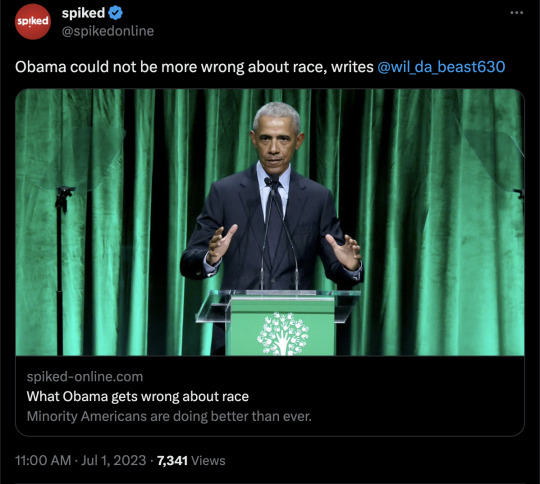
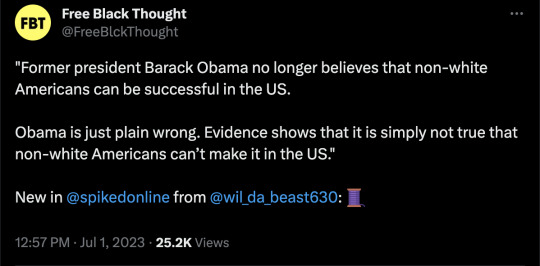



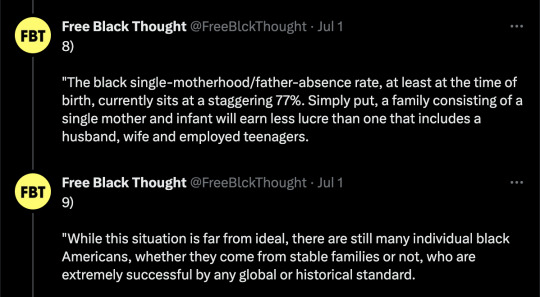

By: Wilfred Reilly
Published: Jun 28, 2023
Former president Barack Obama no longer believes that non-white Americans can be successful in the US.
I am being a bit glib, but only a bit. During a podcast interview last week with former Democratic Party apparatchik David Axelrod, Obama criticised Tim Scott, black Republican senator for South Carolina and 2024 presidential candidate. Scott is well-known for his optimism and belief in the American Dream, previously stating that ‘I know America is a land of opportunity, not a land of oppression’. Taking a clear swipe at Scott, Obama said: ‘I think there’s a long history of African American or other minority candidates within the Republican Party who will validate America and say, “Everything’s great, and we can make it”.’
According to Obama, that belief is untrue. Noting several elements of America’s racist past, Obama declared: ‘We can’t just ignore all that and pretend as if everything’s equal and fair. We actually have to walk the walk and not just talk the talk.’ Before signing off from the show, he went on to describe black and other ethnic minorities as ‘rightly sceptical’ of positive racial messages like those of Senator Scott.
Beyond the sheer bizarreness of a former national leader describing his own country as a racist hole, Obama is just plain wrong. Evidence shows that it is simply not true that non-white Americans can’t make it in the US.
This claim is quickly disproven by a look at the Census Bureau’s lists of household income by ethnicity. The wealthiest population group in the US is not white Americans, but rather Indian Americans. This group brings in a median household income of $142,000 annually, in comparison to just under $75,000 for Caucasians. The second-richest group is Taiwanese Americans, who pull down $119,000 per year for each household. In fact, most of the top 10 highest-earning groups (and all of those consistently averaging six figures per year) are racial minorities – Indians, the Taiwanese, Filipinos ($101,000), Pakistanis ($102,000), Sri Lankans ($97,000), Iranians ($96,000) and Chinese Americans ($93,000).
In contrast, one of the poorer groups listed is white Appalachian Americans, at $50,000 per home per year. On the other hand, black immigrants tend to do fairly well, with the Guyanese, Ghanaians, Barbadians, Trinidadians and Nigerians all coming in at above the $70,000 per year mark. Jamaicans ($66,000) and other West Indians ($64,000) also come close. Nigerian immigrants are one of the best-educated groups in the US, ahead of both Asian and white Americans.
African Americans do quite a bit worse. However, the median black household income as of 2021 – an Appalachia-like $47,000 – still ranks higher than the median household incomes for the UK, Austria and Italy. In any case, the high earnings of African and Caribbean immigrants demonstrate that African Americans’ low performance cannot be due to racism. Rather, it is largely down to the fact that black households tend to have fewer people in them.
The black single-motherhood / father-absence rate, at least at the time of birth, currently sits at a staggering 77 per cent. Simply put, a family consisting of a single mother and infant will earn less lucre than one that includes a husband, wife and employed teenagers. While this situation is far from ideal, there are still many individual black Americans, whether they come from stable families or not, who are extremely successful by any global or historical standard. Tim Scott was himself born into a poor, single-parent household and yet nonetheless managed to rise to the position of senator.
Obama’s ‘cannot succeed’ claim is strange given the reality of modern America, and given his own background and path through life. Simply put, Obama is not a descendant of American slaves. His mother was an upper-middle-class white woman from Kansas and his father was a prominent Kenyan economist. Obama grew up primarily in well-off enclaves, such as in upscale districts of Hawaii’s Honolulu and Indonesia’s Jakarta. Young Obama was surrounded by other wealthy non-white groups and expats. While this might be a little politically incorrect to say out loud, watching him try to explain the US black experience to Scott, a scion of the Carolina cotton country, borders on the surreal.
Interestingly, attitudes like Obama’s (although he didn’t always talk like this) seem to be getting more common among first- and second-generation minority immigrants to the US. This is despite the fact that most of these people have never had a ‘back of the bus’ experience in their lives. To give one typical example, writer and race activist Saira Rao started a fracas on Twitter last week by saying:
‘White people love to say “not everything is about race”. This from the people who committed genocide of Indigenous people, genocide and enslavement of African people. Those behind the Chinese Exclusion Act, Operation Wetback and the Muslim ban. You made everything about racism.’
The remarkable thing about this claim is that even those events on Rao’s list that did happen (US black genocide and a national ‘Muslim ban’ are simply made up) will not have impacted her in any way. Rao is a second-generation Indian American. Only the Exclusion Act might have been potentially relevant to a legal immigrant from Asia. And even then, the act was passed in 1882 and formally repealed 80 years ago. Attitudes like Rao’s are part of a broader trend of post-1965 migrants making embarrassing attempts to link themselves to historical slavery or Jim Crow.
However silly they may sound, the beliefs held by the likes of Obama and Rao can have serious negative impacts. Imagine being told for almost all your life that you are unlikely to succeed. That every social interaction is rigged against you. That the people who seem like your closest football and lunchroom buddies are likely liars and secret racists. How might this affect you?
Hard data give a clear answer. A 2021 study found that these demoralising takes have a real, measurable impact on people. Simply reading a typical despairing passage about ‘systemic racism’ from woke authors like Ta-Nehisi Coates resulted ‘in a significant, 15-point drop in black respondents’ belief that they have control over their lives’. Worse still, we now teach precisely these ideas in schools, colleges and workplaces across the US, often in mandatory classes or training.
At the heart of this discussion is what Thomas Sowell once called ‘a conflict of visions’. The US faces a choice about what to tell new and aspiring citizens about our society. Are we a flawed but ultimately good country, where people of all colours and persuasions can thrive? Or is the US a genocidal racial-caste state, which should be constantly trying to atone for its historical sins?
Let us sincerely hope that we choose to embrace the first vision over the second.
-
Wilfred Reilly is a spiked columnist and the author of Taboo: 10 Facts You Can’t Talk About, published by Regnery. Follow him on Twitter: @wil_da_beast630
==
Remind me again... in which direction do people migrate, as far as western countries are concerned? To or from? /s
#Wilfred Reilly#Barack Obama#systemic racism#victimhood culture#victimhood complex#victimhood#wokeism#woke#cult of woke#wokeness#wokeness as religion#antiracism as religion#antiracism#religion is a mental illness
11 notes
·
View notes
Text
Biggest pet peeve? My father. He doesn't have the balls to raise his kids and struts around in tight clothes, a non-existent hairline and a sad 1 incher 😭.
Dude doesn't know how to run a business or deign shit AND HE WENT TO SCHOOL FOR IT. Dude also wears the same shirts that he wore when he was skinny...he's not skinny no more so they are tight and his nipples are popping out.
I know more about our culture as West Indians than he does. Fucking imagine. Not just that, but I'm told I take after mom, especially when I have to spend time with my dad's side of the family. When I'm there, I'm forcefully enthusiastic, and seemingly a bright conversationalist because everyone is so fucking stale and quiet and cold and dead. I am a kid. That is not my job. It was not my job to run his household whenever I visited.
You don't even take care of my brother. You hook up with one younger girl after another and take care of their fatherless kids better than you take of yours. It was never my job to raise my brother.
Bro doesn't even have rizz 😭 idk how he has all these girlfriends. He's always been nicer and more inviting to people that are not his loved ones. He has that money rizz. Money he doesn't use of Child Support.
I would rant about how he treated my badass of a mom but I don't have time for ALL that.

4 notes
·
View notes
Text
Foundations

I was born in brooklyn, New york and was raised in a pentecostal church. The church was all I knew up until the age of 15. I went to a Spanish speaking church but at home we spoke english. I went to an english speaking school and i grew up in a tiny community, majority of my friends were caribbean a tiny bit were puerto rican. But i didn't even know i was puertorican until i was the age of 7. I knew I was Hispanic of some kind because the church I went to spoke Spanish and my parents would speak about me or stuff they didn't want me to know in Spanish, but I didn't really know who I was. It wasn't until the week on puerto rican weekend i had asked my father where were we from, and as he told me i had got excited. Not just because I was Puerto rican but because I was part of the culture. So that same weekend I asked my parents to buy me all of the flags and the shirts and from then on I wanted to embrace who I was.
My church was made up of mostly Dominican people, so the Spanish I learned there was of Dominican teachings. It was never full of sentences but it was words and what were things called. Most people believe spanish is spanish, but it truly differs based on your origin. I always asked my parents to translate the service, but it's hard to stay focused on what was being said when you are asked to translate, So they translated when they could. I grew up singing in spanish and learning how to read in spanish but ask me anything head on i couldn't speak back to you. Everyone always told me you should speak Spanish, everyone from church down to my family members, but my response was always that my parents never taught or spoke to me in spanish. My family always said it was an excuse but they never spoke to me in Spanish either. What everyone didn't understand was that Spanish in my household was used for arguments, talking about important stuff, for chisme(gossip), or speaking about me. One day as i was ending highschool, i had asked my parents “why didn't they teach me spanish?”. Their response was “they didn't see it as an importance, because my schooling was in english”, but here i am 24 years old with a child and still unable to speak fluently in spanish. Sure I can understand and read it, but to have a conversation with my daughter? Is out of the question.
I was born into church , and as for my siblings they started at the age of 11 yrs and 15 yrs of age. My siblings knew where they came from long before I was born, because my mothers parents, who were from Puerto Rico, were still alive in their childhood. They died before I was born so I never had the opportunity. According to my sibling my grandparents spoke to them in spanish and about puerto rico since they were born. My fathers parents I barely saw, my dad had a semi distant relationship with them, until they got older. My siblings had the privilege of learning who my family really were, both culture and personality. Since my parents were in church I grew up learning and living a christian life. I discovered my talents there and what I can do as a full blown artist. Church is where I found my voice to sing and to desire to create. I would sing in church, create plays and puppets. From there I knew I was created to create and perform.
My upbringings at church other than church were very americanized, other than drinking coffee from a young age I was americanized. My parents too were born out here so it wasn't like they knew what it was like in Puerto rico either other than when they would visit as kids. I had a lot of Caribbean influence being that the majority of my school teachers and principles were west indian up until high school. My parents made sure I was kept out of trouble and gossip and involved in school activities as much as I wanted to. I involved myself in musical theater , singing and art programs as much as I had the opportunity to. Eventually musical theater was what I majored in when I got to highschool. It was all i wanted to do and i kept going until after after school. It wasn't until college where i was an art major that i had the opportunity to have a puertorican history class. This was going to be the class that filled in the missing gaps for me about what I knew about Puerto rico and I was invested.
2 notes
·
View notes
Text
18
In 2020, like much of the world, I experienced a lot of change. However, it felt somewhat less disruptive for me personally than for many others. Yes, the global pandemic turned our world upside down in a matter of days, but it was also the year I turned 18 and was supposed to transition into a young adult – Aaliah, version 2.0, with newfound independence and cooler vibes. I had anticipated a grand transformation in the way people perceived and treated me. I imagined myself becoming more sociable, attending parties, and embracing a more carefree lifestyle, no longer reliant on my parents for permission. Well, as it turned out, that's not quite how things played out. *Cue the sad trombone*
But that's perfectly okay; I could undertake the "Aaliah transformation" right from the comfort of my own home. TikTok had already gained considerable popularity as a social media platform before the pandemic, and I had recently created an account. The platform was rampant with self-proclaimed "self-care" gurus offering advice on how to take care of yourself during lockdown. They covered everything from skincare routines and dietary tips to picking up new hobbies. These content creators were there to both entertain and educate the masses. I found myself saving videos on the best recipes for weight loss, effective at-home skincare remedies, and guides on discovering my personal "aesthetic." Before I knew it, I was comparing myself to the people I saw on the app, wondering why I couldn't look more like them. Unfortunately, this remains a habit I struggle with to this day.
At that time, I weighed 115 pounds and really only had one proper meal a day. Even before the pandemic, I rarely had breakfast or dinner but would grab a sandwich or a snack after school and before my sports practices. Now that I was spending my entire day at home, my eating habits started to change, and I developed a fear of becoming "too big." I was a self-conscious teenager, plagued by worries about whether I was good enough.
My school was relatively small and predominantly Hispanic. In my grade, I could only recall about seven Black students, with me and one of the boys having the darkest skin tones. I also had a bit of a tomboyish style. This combination of factors made me feel somewhat less attractive than my peers. Additionally, I sometimes felt as though I was pigeonholed into the category of the "angry dark-skinned social justice warrior."
I had never been in a relationship, and it seemed like no one had ever shown genuine interest in me, so I felt the need to reinvent myself. Despite my best efforts, I began gaining weight, and to my surprise, I actually liked it. I had always had curves, but now they were more pronounced, making me appear older and healthier, and I thought it suited me. I started experimenting with makeup and trying out new hairstyles and clothing, and I had mixed feelings about the whole process. Each new style I tried seemed to meet with resistance from my parents, making me feel like nothing ever looked quite right on me.
My excitement soared when I received acceptance to Lincoln University. Located in Pennsylvania, it meant I would be on my own, and being an HBCU (Historically Black Colleges and Universities) meant I'd finally get to experience being around more Black people than I ever had in my previous schools, truly immersing myself in American Black culture. I knew I'd never fully grasp it, coming from a West Indian household, but I was thrilled to be around people who looked like me.
When I moved into my dorm, the pandemic was still ongoing, so we had to quarantine for about a week. But after that initial period, college life began to unfold just as I had envisioned, at least for the first week. I hung out with a random group of people initially, only to never talk to them again, as it turned out. However, I embraced the clothing I wanted to wear and felt confident, albeit with a sense of artificial confidence. Strangely, every time I stepped out of my room, I felt a subtle tightness in my chest. Were my hand movements awkward? Why did I make eye contact with that person? They probably think I look out of place. These thoughts weighed on me with every step I took.
In time, I found myself leaving my room only to eat and occasionally get some fresh air. Surprisingly my anxiety about people had nothing to do with COVID and everything to do with my self-esteem. Luckily my room never felt like a prison; it was simply my sanctuary. I oddly never felt lonely, even though I spent most of my time by myself. I would read, watch TikToks, practice my dancing, paint, and do anything I wanted. I even tried out new recipes using a little toaster I definitely wasn't supposed to have. I felt free and content in my self-imposed solitude.
The only thing missing was my family, the food I loved, and the familiarity of my city. Lincoln was in the middle of nowhere, surrounded by farms. There were only fake Italian restaurants and Domino's for dining options. The cafeteria's ethnic food could only hold me over for so long. I missed my mom's pelau and the ability to buy doubles. I longed for visits to the deli and taking the train. Living by myself made me happy, but I wished I could do it back home.
Reflecting on it now, I regret missing out on the opportunity to socialize, but I am grateful for the time I had to be with myself. In hindsight, I see that it was essential for my personal growth. During that time alone, I discovered a deeper understanding of myself and learned to appreciate the journey of self-discovery. In moments of self-reflection and solitude, we often uncover our true selves, which can grow and flourish as we become more self-aware. Life's paradox is that while we seek connections with others, we must also connect with our inner selves. This inner journey helps us become more complete and better at forming meaningful connections with the world.
2 notes
·
View notes
Text
Who is the worst founding father? Round 2: Thomas Jefferson vs William Whipple

Note: Sorry this one is so long, but there is just too much info to include for Jefferson (as well as plenty that didn't make it onto this bio)
Thomas Jefferson (April 13, 1743 – July 4, 1826) was an American statesman, diplomat, lawyer, architect, philosopher, and Founding Father who served as the third president of the United States from 1801 to 1809. Jefferson was the primary author of the Declaration of Independence. Following the American Revolutionary War and prior to becoming the nation's third president in 1801, Jefferson was the first United States secretary of state under George Washington and then the nation's second vice president under John Adams.
Starting in 1803, he promoted a western expansionist policy with the Louisiana Purchase. To make room for settlement, Jefferson began the process of Indian tribal removal from the newly acquired territory.
In confidential talks with French consul Joseph Létombe in the spring of 1797, Jefferson attacked President John Adams and predicted [he] would serve only one term. He also encouraged France to invade England, and advised Létombe to stall any American envoys sent to Paris by instructing him to "listen to them and then drag out the negotiations at length and mollify them by the urbanity of the proceedings." This toughened the tone that the French government adopted toward the Adams administration.
Jefferson lived in a planter economy largely dependent upon slavery, and used slave labor for his household, plantation, and workshops. Over his lifetime he owned about 600 slaves.
During his presidency, Jefferson allowed the diffusion of slavery into the Louisiana Territory hoping to prevent slave uprisings in Virginia and to prevent South Carolina secession. In 1804, in a compromise on the slavery issue, Jefferson and Congress banned domestic slave trafficking for one year into the Louisiana Territory.
In 1819, Jefferson strongly opposed a Missouri statehood application amendment that banned domestic slave importation and freed slaves at the age of 25 on grounds it would destroy the union.
Jefferson never freed most of his slaves, and he remained silent on the issue while he was president.
Since the 1790s, Jefferson was rumored to have had children by his sister-in-law and slave Sally Hemings, known as the Jefferson-Hemings controversy. According to scholarly consensus...as well as oral history, Jefferson probably fathered at least six children with Hemings.
William Whipple Jr. (January 25, 1731 NS [January 14, 1730 OS] – November 28, 1785) was an American Founding Father and signatory of the United States Declaration of Independence. He represented New Hampshire as a member of the Continental Congress from 1776 through 1779. He worked as both a ship's captain and a merchant, and he studied in college to become a judge. He died of heart complications in 1785, aged 55.
Whipple earned his fortune participating in the Triangle trade of the West Indies and Africa, with cargo such as wood, rum, and enslaved humans. He established himself as a merchant in Portsmouth in 1759, in partnership with his brother Joseph.
#founding father bracket#worst founding father#founding fathers#thomas jefferson#william whipple#amrev#brackets#polls
5 notes
·
View notes
Text
I Want to Be an Aristasian But...

Source
Some questions that are often asked by girls who are considering becoming Aristasians
...Will I have to give up my present life?
No. You have probably heard about Aristasians who are fully seceded and live a wholly Aristasian life. Actually, Aristasians live at various levels of secession. We have a concept of “concentric circles”. In the outermost circle are girls who occasionally participate in Aristasian events or who have an Aristasian persona in Elektraspace. In the innermost circle are girls who are fully 100% committed and live a totally Aristasian life. In between those extremes are various levels, or “ring”. We divide them broadly into four, but in fact these subdivide into many more:
4) The Outer Circle. Girls who are completely living in Telluria but occasionally attend Aristasian events or have an Aristasian persona in Elektraspace. 3) Girls who identify as Aristasians but whose life is primarily in Telluria. 2) Girls who identify as Aristasians and whose life is primarily in Aristasia. They will probably live in an Aristasian household, but still have various activities in Telluria. 1) Fully seceded Aristasians who live wholly in Aristasia.
Each girl is encouraged to find her own level. The idea is not that every one should progress to the innermost ring, but that each should find the level wherat she is happiest. Some girls hate the Pit and will only be happy in the Inner Ring, others have many attachments in Telluria and would not wish to be in the Innermost Ring — or could not. All are welcomed as Aristasians.
The Inner Ring, in any case, is by invitation only. If it is where you need to be, and if you fit in as a good Aristasian, you probably will be invited: but you will certainly not find yourself “herded” into the Sacred Enclosure. It is too precious for that!
...How do I get to be an Aristasian?
Pop along to the Club. Give your Aristasian persona a name. Start taking part. If you are genuinely female, you have then already become an Aristasian on the outermost Circle. For deeper levels, you will need to make personal contact with Aristasian representatives, attend events if possible. But even if you are far from Aristasian colonies, a serious girl can get seriously involved.
...I am not white/of mixed race.
We have had this question several times lately; and it does rather surprise us, and sadden us a little. Clearly those who dislike Aristasia — essentially, those who are horrified to find that a “women's movement” is not part of the liberal consensus, but is royalist, elitist and aristocratic — have done rather well at spattering us, in the eyes of some, with the “fascist” and “racialist” (they leave out the middle bit because they can't spell) mud that they throw at every one who disagrees with them.
It is certainly true that we laugh at the bongo “anti-racialist” industry . We also laugh at bongo “anti-homophobia” and at the “gay” industry in general. Does that mean we are heterosexual? We laugh at bongo “feminsm” and “wimmin's rights”. Does that mean we hate women? We have utter contempt for all the bongo social-engineering industries. And we are also an all-female mixed-race group that includes almost no heterosexuals. If that bothers Johnny Bongo — well good. We enjoy bothering Johnny Bongo.
Aristasians do not identify themselves with any Tellurian race or nation. Aristasia Pura is not only a different nation and a different race, but even a different species. And that is where our ultimate allegiances lie. The idea that we should have an exclusive commitment to one Tellurian race over others is absurd.
We have active Aristasians who are of English, American, Chinese, Jewish, African, Indian and various other origins. Naturally, the closer they are to the Inner Ring the more these origins are subsumed into being Pure Aristasian — and of course, Aristasia has its East and its West, its North and its South, its different ways and peoples. None of them are identical to Tellurian ones and all have certain resemblances.
Anyway, to return to the question, please take no notice of Johnny Bongo and his gormless stereotyping. Whatever your origins, if you are ready for Aristasia, Aristasia is ready for you!
... I am not interested in spanking.
This is another fallacy spread by the mass-media — though in this case not quite as fallacious and rather more our fault! Yes, spanking does take place in Aristasia. For most of us it is not so much an interest as a discipline that we encounter (very) occasionally in our Aristasian lives. The mass-media have picked up this aspect of Aristasian life and exaggerated it greatly and, admittedly, it has also been overemphasised in such Aristasian novels as Children of the Void, because their sales into the niche discipline market allowed them to receive widespread publication.
Actually your problem would be much greater if discipline were your main interest in Aristasia. Aristasia is not a spanking club. It does not welcome girls who are just coming for discipline and such girls are, in any case, likely to be rather disappointed, as they will find that it is a very minor aspect of our lives.
The confusion probably arises from the fact that Aristasia is an all-female group. A mixed group with the same disciplinary practices almost certainly would be inhabited by fetishists and discipline obsessives. Men and spanking do not mix, and any mixed group would be well advised to avoid discipline of the Aristasian type.
Many girls find the healthy discipline, academic and otherwise, of elder sisters, schoolmistresses etc. to be a welcome addition to their lives; but if you wish to avoid it that is perfectly easy in the outer rings: and on the inner rings — well, it is just a matter of behaving yourself! Girls who do not wish to be in a stricter ambience can easily spend an Aristasian lifetime without being spanked.
...My current life is very un-Aristasian.
We have a thing in Aristasia called the Law of Manifestation. Without going into the complexities of all that it means, one of its corollaries is that a girl is expected to behave as a 100% Aristasian while she is in Aristasia. This is the same whether she spends 1% of her time in Aristasia or 100%. Unless you are a bonded Aristasian, or are wanting help in moving your life towards Aristasia, what to do?
...Will I have some sort of a mistress telling me what to do?
Only if you want one. If you come to an Aristasian school, of course there will be schoolmistresses and prefects in charge. You may even be playing one yourself for part of the time. If you become a bonded Aristasian, you are, like all Aristasians, a child of the Empress, and through her are in obedience to the Queen, the District Governess and all under them. You will probably have someone to look after you who will probably set you tasks and impose rules.
This will not happen at first. It will not happen unless you want it to happen. And it will not happen unless you prove yourself good enough to be invited in that far. For girls who wish to remain on the outer rings it will never become an issue.
...What is a bonded Aristasian?
A bonded Aristasian is one who has made a real commitment to Aristasia and accepted Aristasian authority in her life. She will normally be in the second or first of the rings described above. She will often have made a family bond with one or more other Aristasians, so she will have Aristasian sisters, cousins, even possibly a mother or daughter. Since Aristasia is a small world with many bonds, it is said that almost all kinship-bonded Aristasians are at least distantly related to all others.
Many outer-ring Aristasians will live happily in Aristasia and take part in Aristasian events of all kinds without any question of bonding ever arising.
Bonding is an important and beautiful commitment; but if you are a new Aristasian, or just thinking about becoming an Aristasian, it isn't a thing to be considering for a long time yet — if ever.
...Will I have to have multiple personae?
Not unless you want to and find them within yourself. Your standard Aristasian persona will doubtless be a little different from your everyday one. That persona will be accepted as fully Aristasian while you are in Aristasia. In practice it may be only a very slight variation on your usual self.
On the other hand, you may want to experiment with finding new persona, in which case Aristasia is the best — if not the only — place to do it. If you come to school you will find a schoolgirl personae, and perhaps also a schoolmistress or prefect.
Beyond that — well, the only limits are those of your imagination! But if you don't like the idea of multiple personae, no one is going to force you.
...Will I be coerced into sexual activities?
Not a very frequently-asked question (thank Dea!) but an idea that has been put about by a small minority of irresponsible scandal-mongers.
The answer is: Very definitely NO.
The chances of any sort of sexual advance being made in Aristasian company are far lower than those at a bongo dance-club or any lesbian bar.
In Aristasia you are among civilised people.
...Do I have to be lesbian or bisexual?
No. If you were eventually to become a full-time Aristasian, obviously you would not have intimate relations with men. What relations you have with other Aristasians is entirely your own affair (if you'll excuse the pun).
We do not feel the need to define ourselves sexually, and generally speaking we do not do so. Some day you may come to have a special relationship with the one you call "my blonde" or "my brunette"; but what that relationship precisely consists of will be a matter for nobody but you and her.
...Do I have to adopt the Aristasian religion?
No. Aristasia is a whole world, and, as with any world, there are religious people and non-religious people. Not many Aristasians are actualy atheists, and most would believe in Dea. This does not, however necessarily entail the practice of any particular religion.
2 notes
·
View notes